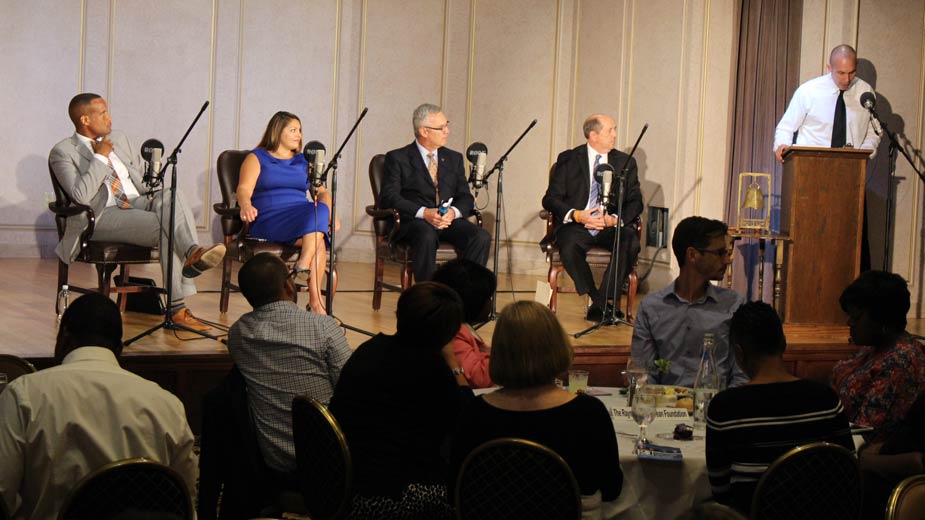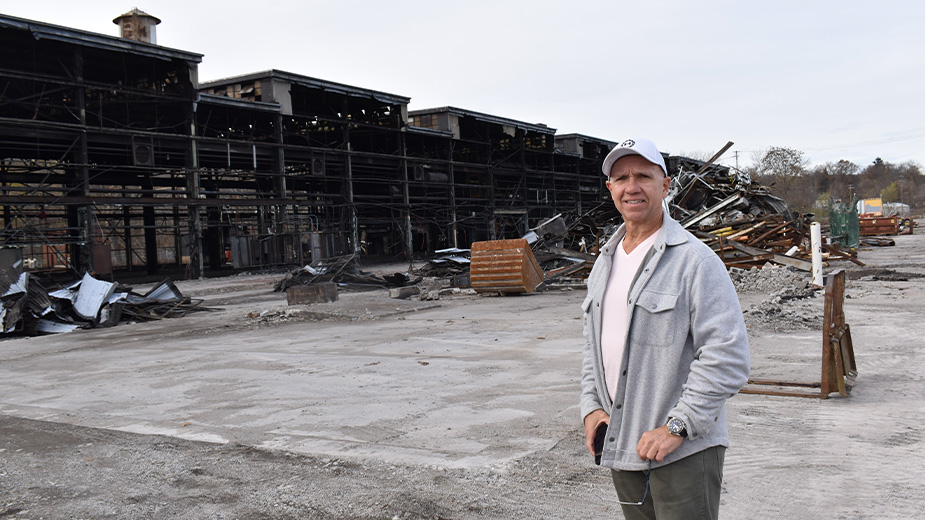City Club Debuts with Focus on Economic Development
YOUNGSTOWN, Ohio – Economic development has evolved from transaction-oriented deal-making to creating an ecosystem that supports economic investment that builds capacity, Jay Williams says.
That’s one of many lessons learned here that the former mayor says he carries to communities across the country in his capacity as assistant secretary of commerce for economic development for the U.S. Department of Commerce.
“There was no better proving ground, no better preparatory experience than to have been here in the city of Youngstown and the Mahoning Valley,” he said.
Williams was among the panelists for last night’s inaugural program of the newly formed City Club of the Mahoning Valley. Other panelists were state Sen. Capri Cafaro, D-32 Hubbard; Youngstown State University President Jim Tressel; and Tom Humphries, president and CEO of the Youngstown Warren Regional Chamber.
“Economic development is about building capacity,” he told the audience of nearly 300 at Stambaugh Auditorium. “It’s about building the capacity so communities ultimately are able to sustain themselves.”
Williams also noted that Youngstown’s creativity and innovation in dealing with its problems – driven in part by the lack or resources in comparison to other communities — often are cited as models for other communities in areas such as neighborhood stabilization.
“I don’t think there’s an appreciation of how many federal programs — specifically in this administration — have been inspired by, informed by or shaped by the innovative approaches that we have undertaken here in the Mahoning Valley,” the former mayor said. “We learned a long time ago that we’re not going to be able to compete on resources but we’re more nimble.” The region also has collaborated with larger communities when opportunities arose.
Cafaro, who noted she is leaving office in about 100 days, was critical of the “long-held belief” that state funding initiatives are dominated by Cleveland, Columbus and Cincinnati, or “the three Cs,” as they are often referred to collectively and derisively. “It’s lazy and it’s not true,” she responded. The Mahoning Valley has fared better in recent years because local stakeholders have collaborated on establishing priorities and speaking with a collective voice.
“It isn’t just about tax credits or tax rates or even infrastructure improvements. We have to recognize government can’t solve all problems,” Cafaro said. “We have to look toward public-private partnerships.”
Williams, responding to a question related to the city’s recent unsuccessful application for a Transportation Investment Generating Economic Recovery – or Tiger – grant, acknowledged local disappointment but noted that the Valley has been on “both the winning end and the losing end” of efforts to secure federal resources.
“Pound for pound, we compete very well,” he said. He urged local communities to take advantage of debriefing opportunities that follow such initiatives.
Tressel stressed the need to collaborate with the K-12 sector for workforce development. Helping each individual find the path they need to take “begins way early. It begins much before they get to us,” he said.
The YSU president cited collaborations underway with Eastern Gateway Community College, Youngstown Business Incubator, America Makes, Mahoning Valley Manufacturers Coalition and Tech Belt Energy Innovation Center.
“Throughout the Valley we have a chance to collaborate, everyone doing what they can do to create the workforce that will then impact that,” Tressel said. “I’m not sure you can do anything great unless you can do it together.”
What didn’t work decades ago was watching the steel industry fall and people sitting on the sidelines waiting for the industry to come back, Humphries said. “We don’t wait anymore.”
One example the chamber president offered, which Cafaro alluded to earlier, was the government intervention on behalf of the automobile industry, which helped sustain General Motors Corp.’s Lordstown plant. Humphries also pointed to the community effort a decade earlier to support the plant when it was in danger of being closed, the chamber-led “Bring It Home” initiative.
Workers and management at the plant “reinvented themselves. They changed what was taking place within those walls,” he said.
The panelists stressed the importance of showcasing educational opportunities offered at Choffin Career Center and other trade schools.
“We probably, for a generation or so, lost the notion that they are invaluable components of our workforce development,” Williams said. Because such options were devalued for so long, “Now we’re having to play catch up.”
In an interview before the event, Williams said he was pleased to visit Youngstown for a business trip and be able to spend virtually every dollar during the trip in or around the downtown area, from dining to staying in one of the Wick Tower’s extended stay suites. “To me, that is demonstrable evidence of the evolution of Youngstown and the Mahoning Valley,” he remarked.
City Club organizers were pleased with turnout for the inaugural event.
“It went exceptionally well,” said Tim Francisco, a member of the committee who acted as moderator for the panel. He pointed to the audience discussing among themselves following the program’s conclusion as one indicator of its success. “As you can see and hear, people are still talking. They’re making connections and they’re having conversations and that’s what the City Club is all about,” he said.
Members of the audience were pleased as well.
“I was extremely impressed,” said Vanetta Perry of Solon.
Perry, whose territory as senior community director for the Northeast Ohio Division of the March of Dimes includes the Mahoning Valley, said she has attended City Club of Cleveland events and found last night’s program “truly centered” on local issues.
Elliot Legow, who grew up in Cleveland and resides in Liberty Township, echoed Perry’s praise and called the presentation “excellent. While it’s easy to leave wondering what was supposed to be done about all the problems discussed, “That’s not the idea of this,” he said.
“This is a discussion. It’s an opportunity to have people talk about important issues to our community and give people in the community the opportunity to ask perceptive questions about these problems,” Legow continued. “It was a really good start.”
Copyright 2024 The Business Journal, Youngstown, Ohio.



